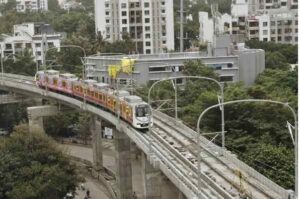Empowering Smart Cities: The Role of Digital Infrastructure in India
In the age of rapid urbanization and technological advancement, the concept of smart cities has gained substantial momentum in India. As urban areas expand, digital infrastructure has become a fundamental building block for transforming these cities into more efficient, sustainable, and citizen-friendly spaces. This article explores the pivotal role of digital infrastructure in the development of smart cities in India and the numerous benefits it brings to citizens.
Digital Infrastructure: The Backbone of Smart Cities Digital infrastructure encompasses a wide range of technologies and systems that enable cities to collect, process, and disseminate data and information for improved urban management. Some of the key components include high-speed internet, data centers, IoT devices, and advanced communication networks. Under the Smart Cities Mission in India, numerous digital infrastructure projects have been established to foster urban innovation.
Data and Analytics Power Smart Cities One of the standout features of smart cities is their ability to harness data and analytics to enhance the quality of life for residents. Data collected through various sensors and devices is analyzed to optimize services, improve traffic management, enhance security, and reduce energy consumption. This data-driven approach allows cities to make informed decisions and allocate resources efficiently.
Key Benefits for Smart City Citizens:
Improved Urban Mobility: Smart traffic management systems powered by digital infrastructure help citizens navigate cities more easily, reducing congestion and travel time.
Enhanced Safety: Real-time data and analytics support smart security solutions, making cities safer by identifying and responding to security threats more effectively.
Sustainability: Digital infrastructure enables cities to monitor and manage resources efficiently, reducing environmental impact and promoting sustainability.
Better Healthcare: Telemedicine and health monitoring solutions are made possible through digital infrastructure, ensuring citizens have access to quality healthcare services.
Enhanced Connectivity: High-speed internet and digital access points are readily available, bridging the digital divide and promoting digital literacy among residents.
Public Services: Access to government services, educational resources, and information is made easier and more efficient, improving the overall quality of life.
Digital Infrastructure Initiatives under the Smart Cities Mission:
Smart Traffic Management: Cities like Bengaluru and Pune have implemented intelligent traffic management systems, which optimize traffic flow, reduce congestion, and minimize commuting times.
Waste Management Solutions: Cities like Indore have introduced smart waste management systems that use sensors to monitor waste levels, ensuring timely and efficient collection.
E-Governance Platforms: Platforms like the “My Ghaziabad” mobile app enable citizens to access government services, report issues, and engage with local authorities digitally.
Smart Grids: Initiatives in cities like Bhubaneswar involve establishing smart grids to manage electricity distribution more effectively, reducing energy wastage. Here are some websites and links where readers can find more information on the Smart Cities Mission in India and related digital infrastructure initiatives:
Smart Cities Mission Official Website:
Government of India – Ministry of Housing and Urban Affairs:
Examples of Smart Cities Projects in India:
Bengaluru’s Smart Traffic Management:
Indore’s Smart Waste Management:
Ghaziabad’s E-Governance Platform – “My Ghaziabad” App:
Bhubaneswar’s Smart Grid Initiatives:
These websites provide detailed information on various smart city projects, digital infrastructure developments, and initiatives implemented under the Smart Cities Mission in India. They offer valuable insights, project updates, and resources for citizens interested in the transformation of urban spaces through digital technology.
Conclusion: Digital infrastructure is the driving force behind the transformation of Indian cities into smart, efficient, and sustainable urban centers. By leveraging data and analytics, smart cities enhance the quality of life for citizens while promoting environmental responsibility. Through initiatives under the Smart Cities Mission, India continues to lead the way in creating urban spaces that are technologically advanced and citizen-focused.
Smart City Citizen is dedicated to providing valuable information on the digital transformation of Indian cities, the Smart Cities Mission, and how these initiatives benefit residents. Stay informed about the latest developments and innovations in your smart city.

Examining the Influence of India’s Smart Cities Endeavor on the Expansion of the CCTV Camera Sector

RailTel to set Telecom Infrastructure for Pimpri Chinchwad Smart City..
Emergency System
Cybersecurity
Future gazing: Start blockchain adoption for smart cities today
Safety & Security
TAKE PART IN CITIZEN ENGAGEMENT PROJECTS
Our Citizen Engagment Team invites Citizens Opinion / Particiaption in Surveys through email, direct to your inbox. We also email about Smart City Projects. Special Events / Gatherings in your city.

